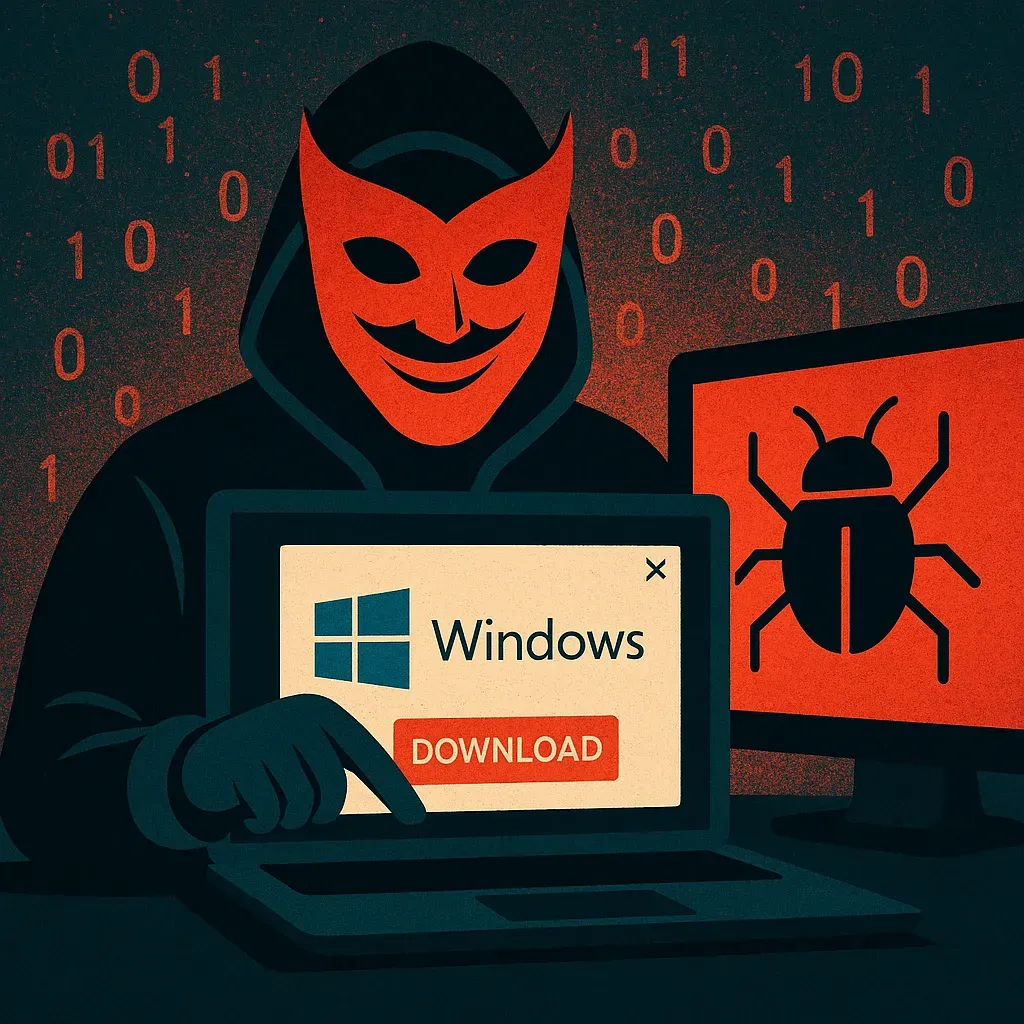The Malware Masquerade: How Fake Windows Downloads Are Hijacking Your Digital Life
Storm-0249 has launched a new attack wave using fake Windows 11 Pro download sites to spread the advanced Latrodectus malware. Learn how this scam works, why it’s effective, and the practical steps you can take to protect yourself and others.

You're on Facebook, idly scrolling, when a slick ad pops up: Free Windows 11 Pro download no activation needed. The branding looks clean. The download button is practically begging you to click. Maybe you're tired of paying for software. Maybe you're just curious.
The second you click? You’re not just downloading an installer you're opening your system to a full-scale cyberattack.
This is not a theoretical scenario. It's a live, global operation run by a threat actor known as Storm-0249, and their weapon of choice is a sophisticated malware loader called Latrodectus. Microsoft flagged a serious escalation in March 2025: Instead of relying purely on phishing emails, these attackers now build fake websites that look eerily similar to real Microsoft download pages.
Fake Windows 11 Pro Sites: A New Breed of Scam
Here’s how the operation unfolds:
Storm-0249 sets up a professional-looking download site offering a “free” version of Windows 11 Pro. Click the button, and you trigger a download from Google Firebase a malicious JavaScript file disguised as a software installer. That file executes an MSI installer embedded with BruteRatel, a tool built to dodge antivirus detection. BruteRatel then delivers Latrodectus, a trojan that opens the floodgates: data theft, ransomware, backdoors all on the table.
And how are they luring people in? Facebook. Microsoft’s security team traced traffic to these malicious sites via Facebook referral URLs, suggesting these links are circulating via ads and deceptive posts.
Who is Storm-0249?
Storm-0249 isn’t new. They made headlines in 2024 with phishing campaigns targeting Microsoft Azure users. Their playbook then was predictable: emails with fake login prompts and sketchy download links. But now, in 2025, they’ve stepped up. They’re not waiting for you to fall for a scam email they’re setting traps where you’re already looking: free software sites, search results, and social media.
Latrodectus 1.9: A Stealth Weapon
Latrodectus isn’t just another virus. This loader has evolved rapidly, and version 1.9 is the most dangerous yet. It can now:
- Detect virtual environments to avoid being analyzed by security researchers.
- Split its data between HTTP headers and POST bodies, making it harder to trace.
- Collect detailed system info, including domain names and machine configurations.
- Maintain persistence using scheduled tasks and execute commands via
cmd.exe.
Translation: It’s designed to hide, adapt, and stay in control.
How to Protect Yourself: Practical Cyber Hygiene
Let’s cut through the noise here’s what really works:
➪ Only download software from official sources. That means Microsoft.com, the Apple App Store, or vendor-approved platforms. “Free” cracked versions aren’t free they’re bait.
➪ Verify file integrity. Use SHA-256 checksums when available. If the hashes don’t match, the file's compromised. Toss it.
➪ Don’t trust surface-level reviews. Look for discussions on Reddit, tech forums, and trusted review platforms like Trustpilot.
➪ Use sandboxing or virtual machines. Testing something sketchy? Do it in a controlled environment. Keep your main system safe.
➪ Enable advanced browser and OS protections. Features like Microsoft Defender SmartScreen and Google Safe Browsing exist for a reason. Turn them on.
➪ Avoid pop-up updates. That “Update your browser” alert probably isn’t real. Update through official channels only.
➪ Upgrade your security stack. Basic antivirus won't cut it anymore. Think tools like Microsoft Defender XDR, Malwarebytes, or Bitdefender for real-time, AI-driven protection.
➪ Share this with the people who need it most. Teens downloading random apps. Relatives clicking everything that says “free.” Small business owners with no IT budget. They’re the real targets.
Final Thought: Complacency Is the Real Threat
Hackers like Storm-0249 count on you being lazy, impulsive, or uninformed. They use social engineering and digital camouflage to trick even the sharpest users. The question isn’t will they try it’s whether you’re prepared when they do.
So next time you see that tempting download link, stop and ask: Am I inviting in a free upgrade… or a digital parasite?
Source




